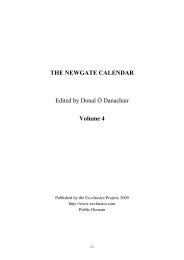PDF format (1.55 Mb) - The Ex-Classics Web Site
PDF format (1.55 Mb) - The Ex-Classics Web Site
PDF format (1.55 Mb) - The Ex-Classics Web Site
Create successful ePaper yourself
Turn your PDF publications into a flip-book with our unique Google optimized e-Paper software.
THE ANATOMY OF MELANCHOLY<br />
to calculate and express the moon's motion: but when all is done, as a supposition, and no<br />
otherwise; not (as he holds) hard, impenetrable, subtile, transparent, &c., or making music, as<br />
Pythagoras maintained of old, and Robert Constantine of late, but still, quiet, liquid, open, &c.<br />
If the heavens then be penetrable, as these men deliver, and no lets, it were not amiss in<br />
this aerial progress, to make wings and fly up, which that Turk in Busbequius made his fellowcitizens<br />
in Constantinople believe he would perform: and some new-fangled wits, methinks,<br />
should some time or other find out: or if that may not be, yet with a Galileo's glass, or<br />
Icaromenippus' wings in Lucian, command the spheres and heavens, and see what is done<br />
amongst them. Whether there be generation and corruption, as some think, by reason of ethereal<br />
comets, that in Cassiopea, 1572, that in Cygno, 1600, that in Sagittarius, 1604, and many like,<br />
which by no means Jul. Caesar la Galla, that Italian philosopher, in his physical disputation with<br />
Galileis de phenomenis in orbe lunæ, cap. 9. will admit: or that they were created ab initio, and<br />
show themselves at set times. and as Helisaeus Roeslin contends, have poles, axle-trees, circles<br />
of their own, and regular motions. For, non pereunt, sed minuuntur et disparent, Blancanus holds<br />
they come and go by fits, casting their tails still from the sun: some of them, as a burning-glass,<br />
projects the sunbeams from it; though not always neither: for sometimes a comet casts his tail<br />
from Venus, as Tycho observes. And as Helisaeus Roeslin of some others, from the moon, with<br />
little stars about them ad stuporem astronomorum; cum multis aliis in cœlo miraculis, all which<br />
argue with those Medicean, Austrian, and Burbonian stars, that the heaven of the planets is<br />
indistinct, pure, and open, in which the planets move certis legibus ac metis. <strong>Ex</strong>amine likewise,<br />
An cœlum sit coloratum? Whether the stars be of that bigness, distance, as astronomers relate, so<br />
many in number, 1026, or 1725, as J. Bayerus; or as some Rabbins, 29,000 myriads; or as<br />
Galileo discovers by his glasses, infinite, and that via lactea, a confused light of small stars, like<br />
so many nails in a door: or all in a row, like those 12,000 isles of the Maldives in the Indian<br />
ocean? Whether the least visible star in the eighth sphere be eighteen times bigger than the earth;<br />
and as Tycho calculates, 14,000 semi-diameters distant from it? Whether they be thicker parts of<br />
the orbs, as Aristotle delivers: or so many habitable worlds, as Democritus? Whether they have<br />
light of their own, or from the sun, or give light round, as Patritius discourseth? An æque distent<br />
a centra mundi? Whether light be of their essence; and that light be a substance or an accident?<br />
Whether they be hot by themselves, or by accident cause heat? Whether there be such a<br />
precession of the equinoxes as Copernicus holds, or that the eighth sphere move? An bene<br />
philosophentur, R. Bacon and J. Dee, Aphorism. de multiplicatione specierum? Whether there be<br />
any such images ascending with each degree of the zodiac in the east, as Aliacensis feigns? An<br />
aqua super cœlum? as Patritius and the schoolmen will, a crystalline watery heaven, which is<br />
certainly to be understood of that in the middle region? for otherwise, if at Noah's flood the water<br />
came from thence, it must be above a hundred years falling down to us, as some calculate.<br />
Besides, An terra sit animata? which some so confidently believe, with Orpheus, Hermes,<br />
Averroes, from which all other souls of men, beasts, devils, plants, fishes, &c. are derived, and<br />
into which again, after some revolutions, as Plato in his Timaeus, Plotinus in his Enneades more<br />
largely discuss, they return (see Chalcidius and Bennius, Plato's commentators), as all<br />
philosophical matter, in materiam primam. Keplerus, Patritius, and some other Neoterics, have in<br />
part revived this opinion. And that every star in heaven hath a soul, angel or intelligence to<br />
animate or move it, &c. Or to omit all smaller controversies, as matters of less moment, and<br />
-48
















